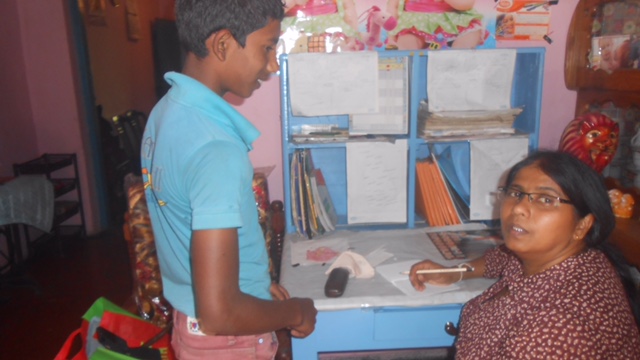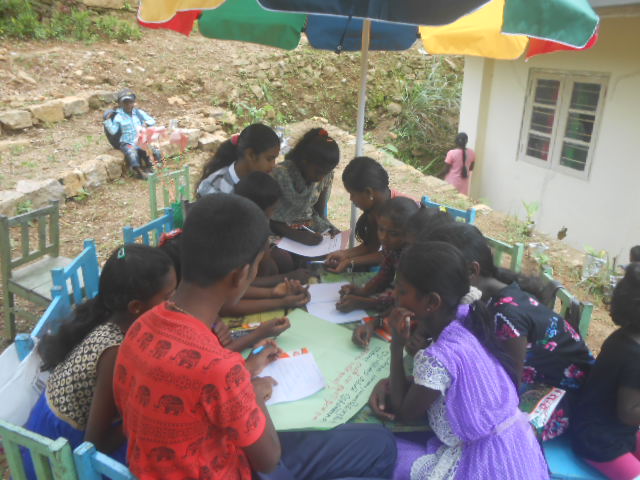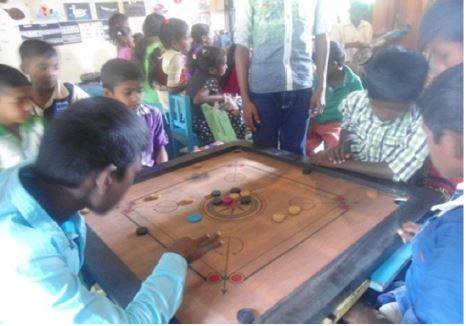World Children's Day for Sri Lanka's Tea Estate Children
Date Posted:21 December 2016 |
Education for Tea Estate Children
Thank you so much for all generous support for our Overseas Aid Fund projects this year. We know that many of you love to hear updates about the work, and so we thought you might be interested in this latest update from Jill Finnane, who recently visited the tea estate where the Education for Tea Estate Children project is currently underway.
Tradewinds and the Upcountry Tamils of Sri Lanka
Many people have heard of the Sinhalese of the Central, South and West of Sri Lanka and the Tamils of the North and East of the country. For 1000s of years both those groups have lived on this island and the world has heard much of their struggles over how to share Sri Lanka, especially since the 1980s. People are not so familiar with the Upcountry Tamils that the British brought from South India to Sri Lanka from 1840 onwards to work as labourers on tea plantations. These Upcountry Tamils are a much ostracised and forgotten sector of Sri Lankan society. Despite having been in Sri Lanka for nearly 200 years, they are often still seen as immigrants. After Sri Lanka gained independence from the British, the new government took away their citizenship and in the 1960s and 70s, 600,000 Upcountry Tamils were forcibly deported to India in a move styled as "repatriation". Those left have continued to live in the British built remote line-huts spread among the hill country tea plantations, often many hilly kilometres to the nearest village. This isolation has intensified their marginalisation from society and has made access to education and skilled employment almost impossible. These plantation workers have the lowest education levels in Sri Lanka and the lowest life expectancy. On most plantations, tea workers still do not own their huts, which in most cases, are dilapidated and unventilated with only 200sq ft per family divided into 2 tiny rooms. Water comes from 3 or 4 scattered outside taps and the 2 or 3 common hole-in-the-ground toilets are even more difficult to get to.
I first became involved in their situation with my husband Michael, through the Tradewinds fair trade campaign that began in the late 1970s with the importing of "just" tea and a campaign to gain citizenship rights for the Upcountry Tamils. Besides importing fair trade products, Tradewinds continues to support two people's organisations in the plantation sector: Satyodaya Centre for Social Research and Encounter based in Kandy and Penn Wimochana Gnanodayam (PWG) based in Hatton. Satyodaya is the centre supporting our current Education for Tea Estate project. The organisation was founded in 1972 as an interfaith, inter-ethnic, inter-linguistic and inter-cultural initiative to support plantation and nearby village communities, providing training in preschool education, health, youth leadership and nutrition. It has helped support preschools, nurseries and income generating initiatives on plantations and conducted highly respected research into issues facing Sri Lanka. The most recent, published in June 2015 is called "The Unheard Voice of Plantation Children in Education".
On 1st October, Michael and I were privileged to be taken by the Satyodaya team to a World Children's Day celebration on the Colgrain tea estate, where the education project we're currently supporting, is taking place. This project is carefully targeted to address the causes of educational disparity on the plantations and develop enthusiasm for education. A parents committee organised the celebration. The most striking thing about these celebrations to me, were the two young people who were MCs of the cultural performances, and the adults' speeches about the importance of parents encouraging their children's education and not being tempted to send them off as uneducated domestics to distant middle class families.
As part of our visit, we were shown the new education area that has been set up so children can gather after school for study, play and socialising. Such a strong demonstration that the community values its children. Families then invited us to visit and take photos of the wooden desks and study walls that had been given to children who have been attending the after school centre. The rooms were so tiny – the charts on the study walls so usefully set up – the families so proud of the desks and their children. So far 45 children are involved and the joyful celebration that day will encourage more to take part. We were so proud to see the immediate results of the donations you have given this past year, which have supported this powerful educational program.
Thank you for the support you have provided which has made this all possible, and if you feel inspired, please spread the word to others, who may also like to support this initiative.
If you'd like to donate to this project, visit our Donations Page.


.JPG)
.JPG)
.JPG)


